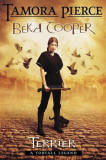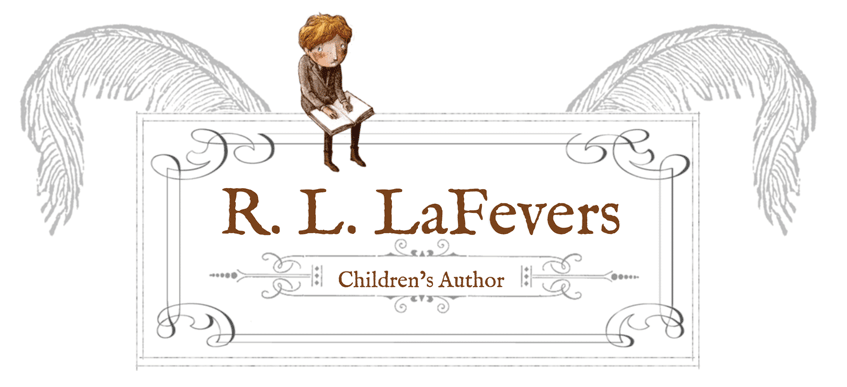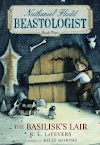This is one of the questions I get asked the most. All writers do. So I thought I’d devote a blog entry to it.
First of all, there are basically three ways to build a story. You can build it from a character, a premise, or a situation. I’ve written at least one book from each of these different ways.
Here’s how they differ.
Character – A miserable, mean twelve-year-old boy
Premise – A miserable, mean twelve-year-old boy finds redemption.
Situation – By befriending a wounded dog, a miserable, mean-spirited boy finds the strength to come to terms with his unhappy home life.
If you look at these approaches, you’ll see that in the second one, we’ve given the story an ending that we want to shoot for. It’s a really vague ending, but now we know where we want to take the story. In the situation, we not only have a character and an ending, but a good grasp of the meat of the story, of the how and why.
So now of course comes the even more basic question. Where do you get ideas for a character or a premise or a situation, let alone a plot? And now is where I’m going to tell you my secret weapon.
Have a curious mind. What if? and I wonder why? are a writer’s two best friends.
Because the simple truth is that stories are all around you. Everywhere you look, there’s a story to be told. Of course, the writer’s job is to make it interesting, and that’s not always easy. But the basic seeds of the story are there, just waiting for you to trip over them.
News, magazines, TV shows, popular culture are all terrific for finding story ideas. Books and movies are great, too. Not to copy, but to use as a launching pad for your own ideas. Maybe they raise an unanswered question in your mind. Answer it. Maybe they give you an idea for a character. Play with it.
Myths & fairytales are marvelous for story ideas. You can remain true to the core of the tale or turn it on its head in a twisted, fractured retelling. Or retell it from unusual point of view.
Personal experience is great, too: family history, your childhood or young adulthood, everyday life. The trick here is to remember that you have to make it interesting. It’s not necessarily your autobiography, although it can be. You’re looking for core ideas, elements, or situations that you can develop into a story.
Once you have a couple of ideas for a story concept, then the real playing begins. Consider different settings: time periods, geography, or cultural. Look at different kinds of physical action (plot) you could have in the story. What the character’s background, social standing, past, gender, age? What are the character’s weakness? Strengths? Fears?
Finally, use the tried and true who, what, why, where, when, and how to massage these vague concepts or premises into a full fledged story idea.
Or at least, that’s how I do it.
Thursday, January 18, 2007
Sunday, January 07, 2007
Myth Busting – You Must Write Every Day
Posted by
Robin L
I think one of the biggest myths in publishing is the one that says you have to write every single day to be a writer.
That is horse pucky, pure and simple. For some people, their process might demand that they write every day, but it is not a universal requirement.
I have never written every day. Ever. My book that was nominated to the Bluebonnet list was written in bits and snatches, many no more than 20 minutes long, with an occasional four hour writing binge on the weekend. With the kids being younger, and much more time consuming, not to mention I had a demanding day job, that’s all I could manage. Another book of mine was written two pages at a time, over the course of a year and a half. With Werewolf Rising I actually walked away from the manuscript for about five months during a crisis of confidence. Even now, I have long, fallow periods, where I can feel the story bubbling and fermenting and fomenting, and I know that if I try to put pen to paper too soon, it will come out green, unripe, only half-formed.
Some writers would have you believe it’s like bricklaying. If you consistently lay five bricks every day, eventually you will have a wall.
But if you don’t take the time to move rocks out of the way, or level the dirt, or make sure the bricks are all the same size, then you’re not going to have a particularly good wall. What if it rains one day and the cement won’t cure properly? What then? Sometimes, waiting and planning and clearing the path is the best course of action.
So if the words or ideas aren’t coming? Take a break. Lighten up. Fill the well. It takes a lot of eclectic input to fuel creativity. Maybe you just ran out of gas. Maybe the story hasn’t gelled yet, or the story egg isn’t ready to crack or you’re just too tired or distracted by other demanding facets of your life. Our emotional lives are the stuff from which writing springs, so how can we ignore them when they demand our attention?
The only thing I would suggest is to try to stay connected to your work somehow, even if you can’t actually do the writing. Some people (those with much better memories than mine!) can carry huge sections around in their head for long periods of time and work on it that way. Story journaling – writing about what you’re going to write about, once you start writing again, has been a lifesaver for me. Often, it ends up priming the pump and lo and behold, I’m writing again!
Other things I do when I just can’t bring myself to write, either from emotional overload or exhaustion, is to sketch out a floor plan or map of the book I’m working on, even though I can’t draw worth spit. It connects me to the physical reality of the world I’ve created in a very visceral way. I collect pictures of great visuals for a collage for the work in progress, again, nailing a visual connection that I refer to time and again as I write the book. Use other creative muscles for working on your writing. Pick out a sound track to your mss, or decorate your heroine’s house for her. You’ll still be keeping in touch with your vision, while not overtaxing the writing part of your brain. And when the story egg is finally ready to crack, you’ll be ready.
That is horse pucky, pure and simple. For some people, their process might demand that they write every day, but it is not a universal requirement.
I have never written every day. Ever. My book that was nominated to the Bluebonnet list was written in bits and snatches, many no more than 20 minutes long, with an occasional four hour writing binge on the weekend. With the kids being younger, and much more time consuming, not to mention I had a demanding day job, that’s all I could manage. Another book of mine was written two pages at a time, over the course of a year and a half. With Werewolf Rising I actually walked away from the manuscript for about five months during a crisis of confidence. Even now, I have long, fallow periods, where I can feel the story bubbling and fermenting and fomenting, and I know that if I try to put pen to paper too soon, it will come out green, unripe, only half-formed.
Some writers would have you believe it’s like bricklaying. If you consistently lay five bricks every day, eventually you will have a wall.
But if you don’t take the time to move rocks out of the way, or level the dirt, or make sure the bricks are all the same size, then you’re not going to have a particularly good wall. What if it rains one day and the cement won’t cure properly? What then? Sometimes, waiting and planning and clearing the path is the best course of action.
So if the words or ideas aren’t coming? Take a break. Lighten up. Fill the well. It takes a lot of eclectic input to fuel creativity. Maybe you just ran out of gas. Maybe the story hasn’t gelled yet, or the story egg isn’t ready to crack or you’re just too tired or distracted by other demanding facets of your life. Our emotional lives are the stuff from which writing springs, so how can we ignore them when they demand our attention?
The only thing I would suggest is to try to stay connected to your work somehow, even if you can’t actually do the writing. Some people (those with much better memories than mine!) can carry huge sections around in their head for long periods of time and work on it that way. Story journaling – writing about what you’re going to write about, once you start writing again, has been a lifesaver for me. Often, it ends up priming the pump and lo and behold, I’m writing again!
Other things I do when I just can’t bring myself to write, either from emotional overload or exhaustion, is to sketch out a floor plan or map of the book I’m working on, even though I can’t draw worth spit. It connects me to the physical reality of the world I’ve created in a very visceral way. I collect pictures of great visuals for a collage for the work in progress, again, nailing a visual connection that I refer to time and again as I write the book. Use other creative muscles for working on your writing. Pick out a sound track to your mss, or decorate your heroine’s house for her. You’ll still be keeping in touch with your vision, while not overtaxing the writing part of your brain. And when the story egg is finally ready to crack, you’ll be ready.
Thursday, January 04, 2007
Reading Recommendation-Terrier: Beka Cooper
Posted by
Robin L

First of all, I have to confess that TERRIER is the very first Tamora Pierce book I’ve ever read. And it was excellent. One of my favorite books in a loooong time. I cannot recommend it highly enough, to both kid and adult readers alike. And if you have a teen or tween daughter, I doubly recommend it.
The book is deftly plotted, but even so, it is the characters that make this book shine. From the main character, Beka Cooper, to the supporting cast and ancillary characters—they all came to life for me. And Beka is brilliantly portrayed. She is a tough girl who’s known hardship and loss and will look after her own. This leads her to a career in the Provost’s Dogs, which is very similar to a medieval, inner city police force. Beka is strong and tough and determined (hence the nickname Terrier) but she also struggles with nearly crippling shyness and a family who doesn’t appreciate or value the choices she makes. Even so, she continues on with her duties, not letting their doubts or lack of appreciation slow her down. Beka is so full of heart and determination! And so committed! But never in a annoying, cloying, or preachy way.
From what I understand, Tortall, the world TERRIER is set in, is the backdrop for a number of Ms. Pierce’s books. It felt very real to me, very grounded. Nothing felt unfamiliar or took me out of the story, which is more difficult in world building than it sounds. Beka deals with the Lower City, the slums where robbers, thieves, cutthroats, and other lowlifes prey on the less fortunate.
The whole book is full of wonderful characters, but I was particularly struck by the strong women characters, which I know are a trademark of Pierce’s, but were new to me. Again, I cannot recommend this book highly enough. But be sure to clear your calendar for a day or two, because you won’t want to leave the world of the book once you’ve started. Oh. There is one cautionary note. There are about six prologues. Ignore ‘em. Unless you’re a long time Pierce reader, they won’t mean anything to you and will possibly deter you from starting the book.
Not only a Five Star book, but one that’s earned a spot on my keeper shelf!
Wednesday, January 03, 2007
Welcome to 2007!
Posted by
Robin L

So obviously one of my New Year’s Resolutions is going to be to be a more regular blogger! I promise!
First off, some updates.
I’ve posted the revised cover for my next novel, which also has a slightly shorter name now, Theodosia and the Serpents of Chaos. It’s still very much in keeping with the first cover, and I’m still madly in love with it. It was changed because The Powers That Be were concerned that my original title was too long, and such a mouthful, that it might put some readers off the book. And while I did like the original title, I didn’t want to risk even one reader being intimidated by it, so I listened to Those Who Know About Such Things.
There are also some new blog entries up on the Theodosia blog for any of you who are following that.
I also got some great reading done during my blogging hiatus, so I’ll have a review up for you later today or first thing tomorrow.















